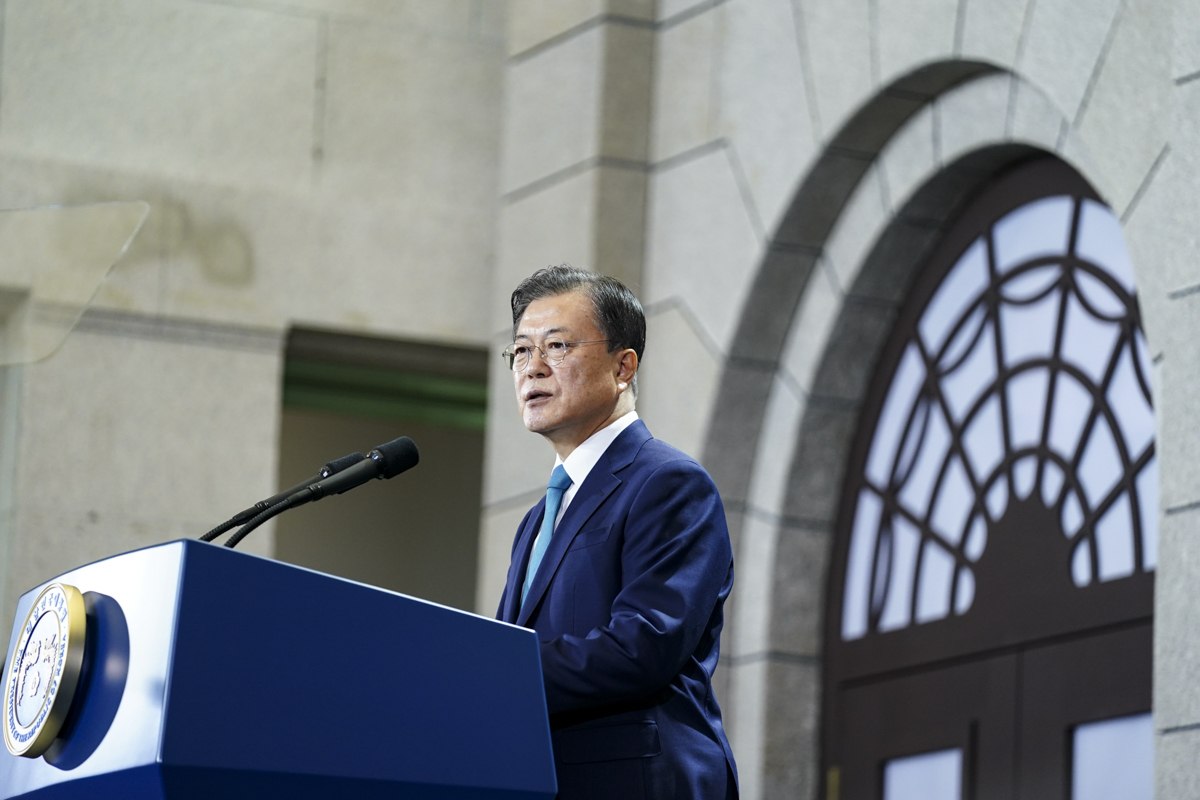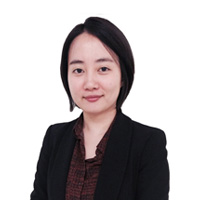
A potential South Korea-Japan summit may face further delays despite Monday’s election of Japan’s new Prime Minister Fumio Kishida, amid protracted rows over wartime history and trade.
President Moon Jae-in held no summit with Kishida’s predecessor, Yoshihide Suga, during his one-year tenure. The two governments had sought to arrange a meeting between Moon and Suga on the occasions of multilateral events, including the G-7 summit in June and the Tokyo Olympics in July, but related talks fell apart at the last minute due to discrepancies over timing and topics to be discussed.
Uncertainties have likewise grown over a possible summit between Moon and Kishida. With no immediate breakthrough in sight in their soured bilateral ties, a multilateral meeting is seen as a better occasion for a first encounter between the leaders. But chances are slim for the time being as Kishida’s global debut may be delayed due to Japan’s general election on Oct. 31.
Citing the tight campaign schedule for the election that would be his first major test in domestic politics, Kishida told reporters Monday that he would take part in the Group of 20 summit in Italy and the COP26 climate summit in the UK virtually -- both pending multilateral meetings Moon is likely to attend in-person.
“With Kishida’s absence from key global events, there seems no immediate breakthrough in sight in the almost collapsed diplomacy between the two countries. Their summit meeting could face further delay ahead of major elections in both countries in the coming months,” a diplomatic source said on condition of anonymity.
Kishida’s election comes at a time when South Korea and Japan have long been at odds over territory and historical disputes stemming from Japan’s 1910-45 colonial rule of the Korean Peninsula.
In 2015, Kishida played a key role as foreign minister in striking a controversial 2015 agreement between Seoul and Tokyo to resolve the sex slavery issue “finally and irreversibly.” But Moon, who took office in 2017, rebuked the agreement, saying the government has no intention to intervene in legal fights by individuals for compensation.
In 2019, Japan imposed restrictions on exports of three key industrial materials critical for South Korea’s chip and display industries. South Korea called it a retaliatory move against Seoul’s court rulings in 2018 ordering Japanese firms to compensate South Korean victims of forced labor during Japan’s colonial rule.
Since then, bilateral ties have chilled, with Korean diplomats facing near-open hostility in Japan. A Japanese prime minister usually accepts a courtesy call from a newly appointed Korean ambassador upon arrival. But Suga left office without holding a meeting with Korean Ambassador to Japan Kang Chang-il, who arrived in Japan in January.
Despite a flurry of reconciliatory overtures from Moon over the past months, Japan has remained lukewarm so far, saying it would return to dialogue once South Korea comes up with countermeasures to prevent recurring compensation claims by Korean victims of Japan’s wartime atrocities.
Following the election of Kishida, Seoul’s presidential office sent a congratulatory letter, saying South Korea is ready for dialogue with Japan’s new Cabinet.
“President Moon hopes that the two countries will set an example for cooperation as neighboring countries and as the closest countries in terms of their geography and culture, and as they share basic values in democracy and principles of market economy,” presidential spokesperson Park Kyung-mee said.
Japan’s response to the letter was not revealed immediately. In his first press conference on Monday, Kishida made no specific comment on the strained ties with South Korea.
On the North Korean issue, he stressed he was willing to meet North Korean leader Kim Jong-un “without any conditions” to secure the return of Japanese abductees -- reiterating a Pyongyang policy held by his predecessors.
Observers predict no drastic change in Kishida’s South Korea policy as he retained two highest-profile members of Suga’s Cabinet – Foreign Minister Toshimitsu Motegi and Defense Minister Nobuo Kishi – to their current posts.
The first phone call between Moon and Kishida is expected to offer a more specific clue for the new Japanese leader’s stance on the diplomatic direction with its closest neighbor.
On Tuesday, Cheong Wa Dae declined to comment on the timing of the first phone call, citing the sensitivity of the issue. On Monday, Kishida spoke with US President Joe Biden in his first call with a foreign leader. During the first phone conversation, the two leaders pledged to cooperate on security challenges posed by China and North Korea and agreed to hold an in-person summit soon.
President Moon Jae-in held no summit with Kishida’s predecessor, Yoshihide Suga, during his one-year tenure. The two governments had sought to arrange a meeting between Moon and Suga on the occasions of multilateral events, including the G-7 summit in June and the Tokyo Olympics in July, but related talks fell apart at the last minute due to discrepancies over timing and topics to be discussed.
Uncertainties have likewise grown over a possible summit between Moon and Kishida. With no immediate breakthrough in sight in their soured bilateral ties, a multilateral meeting is seen as a better occasion for a first encounter between the leaders. But chances are slim for the time being as Kishida’s global debut may be delayed due to Japan’s general election on Oct. 31.
Citing the tight campaign schedule for the election that would be his first major test in domestic politics, Kishida told reporters Monday that he would take part in the Group of 20 summit in Italy and the COP26 climate summit in the UK virtually -- both pending multilateral meetings Moon is likely to attend in-person.
“With Kishida’s absence from key global events, there seems no immediate breakthrough in sight in the almost collapsed diplomacy between the two countries. Their summit meeting could face further delay ahead of major elections in both countries in the coming months,” a diplomatic source said on condition of anonymity.
Kishida’s election comes at a time when South Korea and Japan have long been at odds over territory and historical disputes stemming from Japan’s 1910-45 colonial rule of the Korean Peninsula.
In 2015, Kishida played a key role as foreign minister in striking a controversial 2015 agreement between Seoul and Tokyo to resolve the sex slavery issue “finally and irreversibly.” But Moon, who took office in 2017, rebuked the agreement, saying the government has no intention to intervene in legal fights by individuals for compensation.
In 2019, Japan imposed restrictions on exports of three key industrial materials critical for South Korea’s chip and display industries. South Korea called it a retaliatory move against Seoul’s court rulings in 2018 ordering Japanese firms to compensate South Korean victims of forced labor during Japan’s colonial rule.
Since then, bilateral ties have chilled, with Korean diplomats facing near-open hostility in Japan. A Japanese prime minister usually accepts a courtesy call from a newly appointed Korean ambassador upon arrival. But Suga left office without holding a meeting with Korean Ambassador to Japan Kang Chang-il, who arrived in Japan in January.
Despite a flurry of reconciliatory overtures from Moon over the past months, Japan has remained lukewarm so far, saying it would return to dialogue once South Korea comes up with countermeasures to prevent recurring compensation claims by Korean victims of Japan’s wartime atrocities.
Following the election of Kishida, Seoul’s presidential office sent a congratulatory letter, saying South Korea is ready for dialogue with Japan’s new Cabinet.
“President Moon hopes that the two countries will set an example for cooperation as neighboring countries and as the closest countries in terms of their geography and culture, and as they share basic values in democracy and principles of market economy,” presidential spokesperson Park Kyung-mee said.
Japan’s response to the letter was not revealed immediately. In his first press conference on Monday, Kishida made no specific comment on the strained ties with South Korea.
On the North Korean issue, he stressed he was willing to meet North Korean leader Kim Jong-un “without any conditions” to secure the return of Japanese abductees -- reiterating a Pyongyang policy held by his predecessors.
Observers predict no drastic change in Kishida’s South Korea policy as he retained two highest-profile members of Suga’s Cabinet – Foreign Minister Toshimitsu Motegi and Defense Minister Nobuo Kishi – to their current posts.
The first phone call between Moon and Kishida is expected to offer a more specific clue for the new Japanese leader’s stance on the diplomatic direction with its closest neighbor.
On Tuesday, Cheong Wa Dae declined to comment on the timing of the first phone call, citing the sensitivity of the issue. On Monday, Kishida spoke with US President Joe Biden in his first call with a foreign leader. During the first phone conversation, the two leaders pledged to cooperate on security challenges posed by China and North Korea and agreed to hold an in-person summit soon.



















![[Today’s K-pop] Treasure to publish magazine for debut anniversary](http://res.heraldm.com/phpwas/restmb_idxmake.php?idx=642&simg=/content/image/2024/07/26/20240726050551_0.jpg&u=)